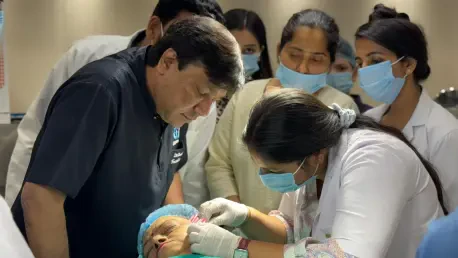A sweeping corruption scandal has laid bare the widespread malpractices within India’s medical college accreditation system, shaking the core of educational integrity. This scandal has unveiled an intricate web involving influential personalities such as Rawatpura Sarkar, former University Grants Commission Chairman D.P. Singh, and various medical professionals who were embroiled in unethical dealings. The investigation, led by the Central Bureau of Investigation (CBI), resulted in the arrest of six individuals, including three doctors, implicated in bribing authorities to the tune of Rs 55 lakh. The bribe aimed to secure a favorable evaluation for the Shri Rawatpura Sarkar Medical College, overlooking its significant deficiencies. This scandal underscores the alarming extent to which corrupt practices have infiltrated the regulatory framework, undermining the integrity of medical education in India.
Unveiling the Corruption Network
The CBI’s intensive probe into the scandal revealed a complex syndicate where corruption was not limited to lower-level personnel but involved high-ranking officials within the Ministry of Health and the National Medical Commission. In a breathtaking sequence of events, these officials were found exploiting their authoritative positions, facilitating illicit practices, and ultimately risking public health standards for personal gain. Over 40 raids were conducted across several Indian states, including Madhya Pradesh, Chhattisgarh, and Delhi—a testament to the seriousness of the allegations. The investigation flagged 34 individuals for their involvement, with charges revolving around both the Prevention of Corruption Act, 1988, and the Bharatiya Nyaya Sanhita, 2023. Those accused are alleged to have colluded to bypass standard regulatory processes, leak confidential inspection schedules, and forge compliance documents, all of which were integral to their fraudulent scheme.
Prominent among the accused is SRIMSR’s Chairman, Ravi Shankar Ji Maharaj, whose involvement indicates the scandal’s reach into the highest echelons of academic administration. By orchestrating the illegal recognition of private medical colleges, these individuals not only breached ethical norms but significantly compromised the educational assessment system. The manipulation of inspection processes allowed colleges to skirt genuine verification procedures, placing prospective medical students unknowingly in defective educational structures. It is a grim illustration of how systemic malpractice can endanger not just the credibility of educational institutions but also future generations of medical professionals who rely on these learning environments.
The Far-Reaching Impacts and Ethical Breaches
The implications of this corruption scandal reach far beyond immediate arrests and investigations, touching upon the very fabric of India’s educational standards and governance. The pre-arrangement of essential college evaluations marks a significant ethical violation that demands a comprehensive reevaluation of oversight mechanisms. Such breaches in ethical conduct erode the trust placed in educational bodies responsible for shaping future medical practitioners. As the situation unfolds, it reveals profound challenges in maintaining transparency and accountability within systems designed to safeguard educational integrity.
Moreover, the fallout from the scandal spotlights the broader issues of governance and regulatory oversight, prompting a reevaluation of existing policies to prevent future infringements. It raises pressing questions about the accountability measures in place and highlights the necessity for stronger, more transparent frameworks capable of withstanding manipulative practices. The case calls for immediate action to reinstall trust in the institutions responsible for accrediting medical colleges by implementing rigorous audits, independent inspections, and stringent penalties for violations.
Moving Forward with Reformative Measures
The CBI’s thorough investigation into the scandal uncovered a vast network of corruption extending beyond minor officials to include top-level figures within the Ministry of Health and the National Medical Commission. These high-ranking officials exploited their positions to facilitate unethical practices that jeopardized public health for their personal benefit. The gravity of the situation was underscored by over 40 raids across various Indian states—Madhya Pradesh, Chhattisgarh, and Delhi—highlighting the seriousness of the offenses. The probe identified 34 individuals implicated in violations of both the Prevention of Corruption Act, 1988, and the Bharatiya Nyaya Sanhita, 2023. The accused allegedly colluded to evade regulatory standards, leak confidential inspections, and falsify compliance documents. Notably accused is Ravi Shankar Ji Maharaj, SRIMSR’s Chairman, reflecting the scandal’s penetration into top academic circles. Their unlawful recognition of private medical colleges undermined ethical standards and the educational system, deceiving prospective medical students and endangering future medical professionals relying on these programs.









